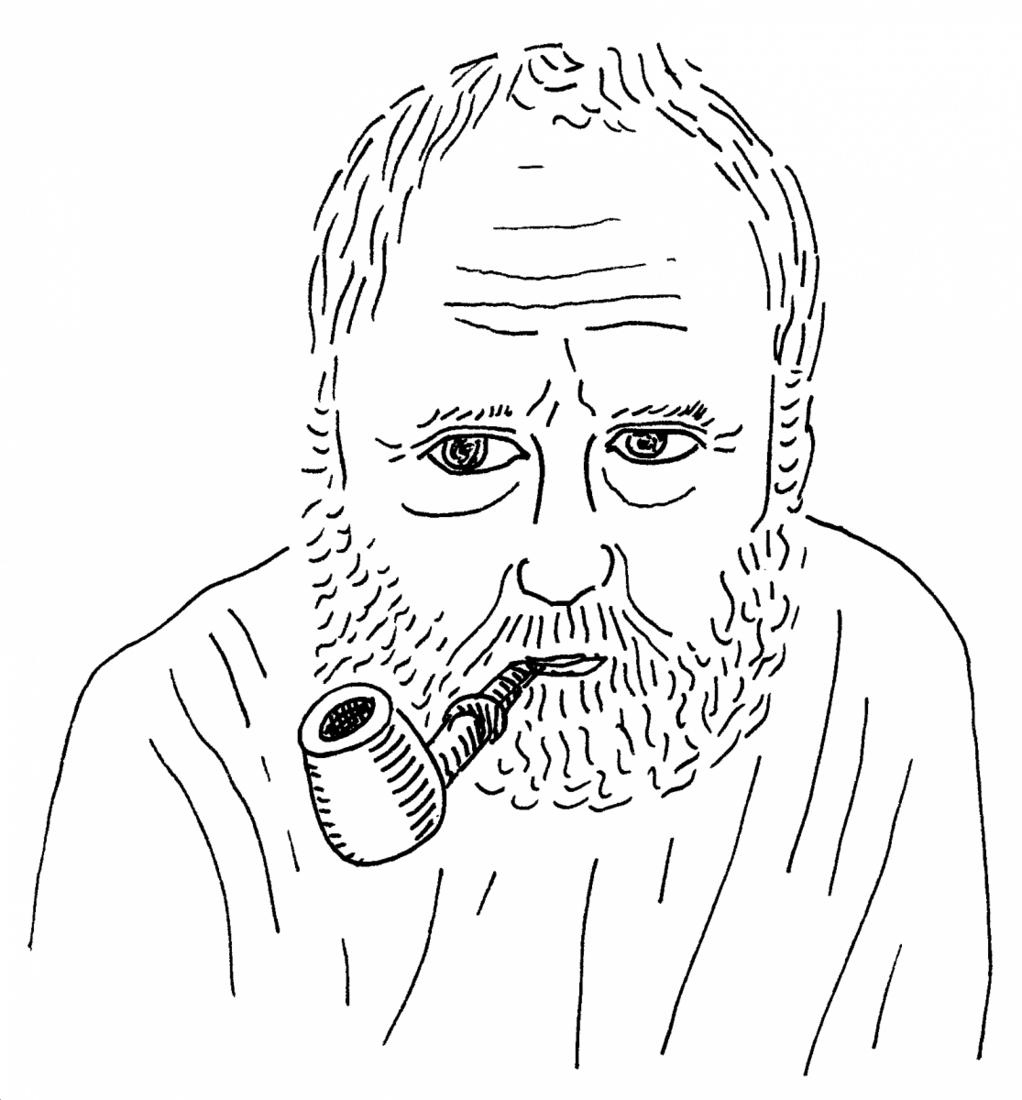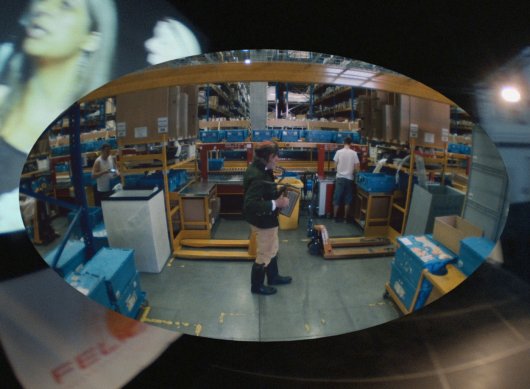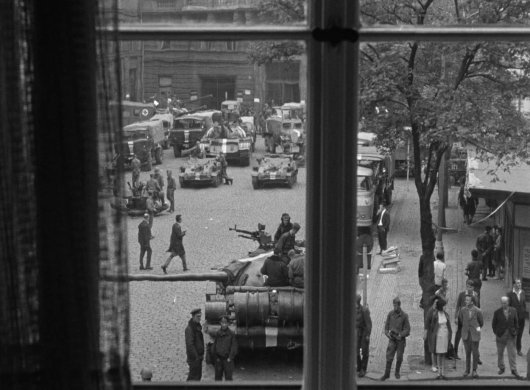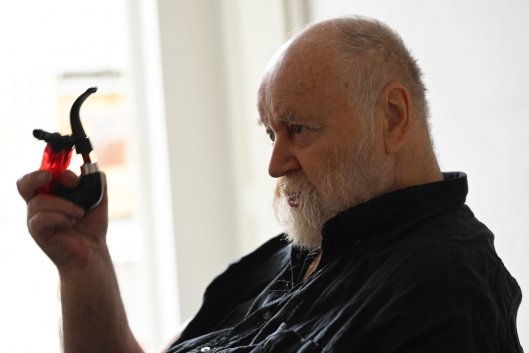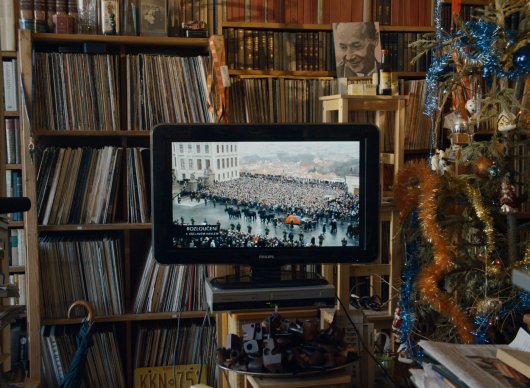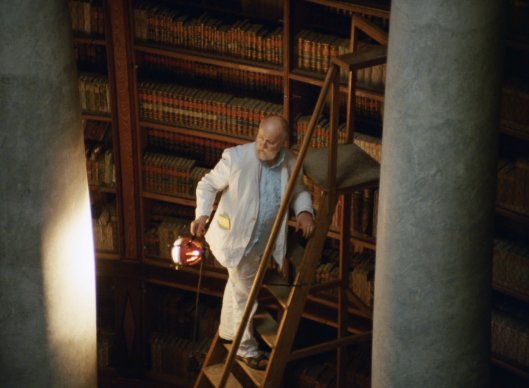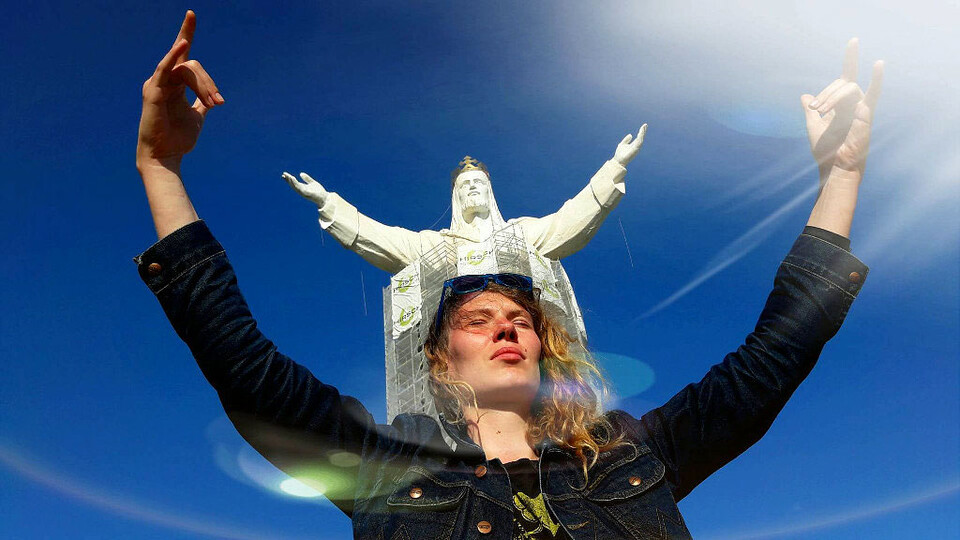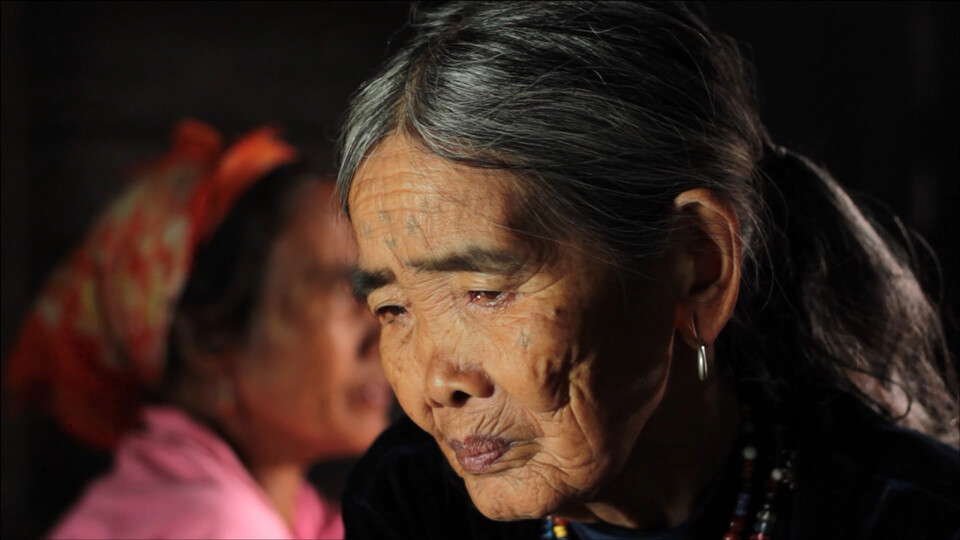Karel Vachek: Films Just Have to Make You Laugh!
In what sense are you using the term “communism” in your film? Is the film portraying communism as a utopia that is still alive for you?
Communism was the last big utopia. All utopians in the past knew that property and power had to be scattered among the people. Thomas More, Tommaso Campanella, Henri de Saint-Simon, Charles Fourier – all of those dreamed of a society where people work in harmony and are not afraid of one another. However, no revolution managed to produce such a society – every coup only gave rise to new rulers and owners.
Utopias are beautiful. But they have never been successful – look at how violent October Revolution was in Russia and the gulags that followed.
That’s nonsense. It is not about implementing a utopia, but about a change desired by the majority. As soon as you start implementing the change, it becomes clear that a big group of people actually doesn’t want it because they were originally doing better than others. Show me some a rich British guy who would want a parliament without a ruler or a French nobleman who would want to become an ordinary citizen – those usually ended up under the guillotine. When the ball starts rolling, horrible things happen. But it is important to keep in mind that thanks to the French Revolution we have all become citizens, that we are grateful to Cromwell for the parliament and that the revolution in Russia showed us that property doesn’t have to be owned, only personally managed. And by all citizens! For the first time in history, it is possible to be free of leaders after the revolution – free of owners and new rulers – you don’t need leaders. There will be no need for representative democracy because everyone will be representing themselves.
Thanks to the net – the Internet?
Yes! A cardinal technological transformation occurred in the form of the Internet. It is transforming the structure of the society and for the first time in history it allows for elimination of representatives. People can be connected directly through the net and decide everything by themselves. Expertly qualified clerks can be hired for that purpose.
The net is only an instrument. And it is also the source of many problems, disseminating ideas that can be dangerous – look at fake news.
Yes, the net is an instrument but there has never been one like this in our history. And I am indeed aware of the problems – thanks to the Internet, the USA has Donald Trump for their president and Boris Johnson is UK’s prime minister. Well of course, the future will be horrible. My movie says that it will be a massacre. I also know that the net can be attacked and hacked. Look for instance at nuclear energy – it is a good thing and at the same time you can’t stop anyone from inventing an atomic bomb and throwing it at other people. All can be misused. I didn’t invent the Internet, I only point out the consequences as well as the good things it can bring.
In this respect, the film’s ending can almost be read as some sort of an appeal.
I believe that nobody has ever put it as precisely as me – after all, who else would be so silly to talk about it?
From the film Communism and the Net or the End of Representative Democracy
However, the film does not mention the pitfalls of the Internet. Why?
In that case, I would have to focus on the risks only – risks that are in fact related to any kind of revolution. My film is right off the bat – showing what a massacre it will be. But indeed, the net will bring a substantial change comparable for instance to the invention of the steam engine that heralded the end of feudalism.
In this context, what I found missing in your film was the current Czech movement called Million Moments for Democracy that organises demonstrations across the country. And it is thanks to the Internet that these people can organise themselves...
I am happy that these things are happening, of course. But such rallies are tricky in that their space is used by people who are hoping for positions in some future political system. And besides, they don’t talk about any specific things that should be changed, they only protest against certain rulers and owners – they only want to change them for others. And that is wrong, they should understand that the whole concept of representative democracy is bad. But this is not what they tell you at these rallies. The best thing would be to abolish Czech politics.
There is a different aspect of your film, a deeper and more personal one, you call it the Gnostic level.
All big mystics such as Angelus Silesius and Ladislav Klíma were informed by Gnosticism. Once you let go of your ego you have the chance to touch the deeper layers of your inner self. You either follow your fate, that is you live within the framework of causes and effects, or you can become a Gnostic, in Christian terms – you are also the god, that who participates in a life that is alive – in a miracle. When you manage to do that in your mind, you are able to come up with a theorem like Pythagoras, or invent alternating current, for example – I’m just kidding!
How can you let go of your ego?
There is no path or manual. You have to come into confrontation with the system you are living in, and search for a less painful way of existence. Life is only a misery. And once you start doing that, you also have to pay the price - you will suffer several punches in the head that might change you so much that you will reach deeper within yourself, and transcend your ego. Life sometimes brings such situations that no matter where you go, left or right, both is wrong. Especially when you like entering spaces where you are not allowed to go. At that point you start learning which wrong is actually right – right for your journey. You are laughing at all the signals telling you that something deeper inside you is thinking.
From the film Communism and the Net or the End of Representative Democracy
Is this the inner laughter that you are talking about in your book The Theory of Matter?
Yes. What I’m saying is that you just need to be “stupid” in a way. Like good Soldier Švejk – who is he actually? He is neither “good” nor “bad”, neither “smart” nor “stupid”. Švejk is doing exactly what he is supposed to be doing, which sometimes looks like he is misbehaving! And when you are behaving exactly how you should be, you are parodying the systems that act like they know what is right and what is wrong.
But that doesn’t only apply to politics...
Of course not! This is for instance also about the morality of the system. Someone who takes all of their clothes off can either be Ivan Jirous who does this in the right place, or a fool who should be taken to an asylum. Ivan Jirous, for instance, went to an exhibition at Malá Strana, got undressed and ruined the whole thing because these exhibitions are often just for the show, they are pointless. He intuitively knew it so he went there to ruin their pretentious atmosphere. He knew exactly where to take his clothes off.
Who are you making your films for?
For myself. The only purpose of art is to achieve a philosophical relationship with the world. Today you have so many people who think of art as something nice and eye-catching. Because they don’t think of anything else than how to have fun. The result is terrible, sometimes even terribly intense. I also call it magical. Those “artists” can only perform magic, which means that they can work with magic, dreams, visions, and enter other realms. That can be dangerous and there is no humour in it. Reality should not be confused with magic because you can no longer tell right from wrong in those worlds. I agree that Jan Preisler was a notable painter, but I don’t want to have his paintings at home. Alfons Mucha’s paintings, on the other hand, contain laughter, you feel good when you are around them. He was a Gnostic, just like Mikoláš Aleš, Piet Mondrian and Camille Corot.
To me, that sounds like your own subjective evaluation of art – yes to Mondrian, and no to Preisler. What makes you say that?
I didn’t say no to Preisler! You see how silly a bit more truthful statement can sound. This is just experience and not all people have learnt it. I did thanks to my wife Dagmar who was smarter than me. I struggled to learn how to tell the difference between what is magic and what is Gnosticism until she made me listen to operas by Bedřich Smetana. At first I found them silly, but it was this lovely silliness. Similar to Mucha’s work, they both were Gnostics. Smetana’s music is full of inner laughter and it can work as a remedy.
So you perceive art as the art of harmony. But how to achieve this harmony?
Art simply has to make you laugh! Harmony is achieved when you want something as much as you don’t want it. This creates internal balance.
Karel Vachek. Photo Josef Kokta
Are you a Gnostic yourself?
I guess I have some abilities and some knowledge. But I would not want to specify their quantity or quality. I know when my inner self is doing fine. When not, I always try to pinpoint what I did wrong. I also believe that I have some abilities because when I met my wife for the first time, I knew it was “her”. And we spent fifty years together. She died just a couple of years ago. Her mere existence was my joy. Most of my life I didn’t know how many things she was aware of. And yet, this was what forced me to try new paths. And I learned a lot. Things have a more complex background than it may seem.
This complex background also seems to be the essence of your films. What first looks like incoherent footage only gradually forms a shape where different lines come together to create a consistent narrative. But this takes some time.
It all might at first seem very fragmented. The film’s first act – “Communism” introduces the subsequently recurring themes that untangle later in the film. That is also why the film moves faster and faster towards the epilogue. It is important to keep the drive. What I find most valuable is that this huge space in my films remains interesting and alive until the end.
How do you compose your films? Do you work with a preconceived structure or you follow your intuition?
I create films as if I was making a painting. I work simultaneously on all of its parts. I am watching them again and again until I can see something missing somewhere. I have some footage that I find important, so I’m watching the film and suddenly I can see where I can put it. Every day, I went to the editing room and watched the film. Only Sunday was a day off, otherwise we went on for six hours a day, and then we couldn’t keep concentration.
What footage did you start your film composition with?
I had my previous films, but I didn’t actually use the best scenes – I was looking for footage that would be relevant today – for example, I was focusing on the Korean dictator and then I saw some parallels with Václav Havel, so I included some scenes with Havel and then I wanted to indicate that he had two different sides depending on which woman he was with, and that’s where his two wives step in. These are only hints. I went on to include Ivan Jirous in a scene where he says that he has stopped writing Havel’s biography. I simply have an idea and look for footage to develop it. You have to express a certain point at a certain moment using a certain form to obtain the right proportions so that it does not look like a film against Václav Havel, for instance. And this is how the film becomes alive. Actually, films are against everyone, including myself!
Your films are very long, the last one takes five and a half hours. How do you know that the film is finished?
When I have no more ideas. These things are flowing, one evolves from another, and if some idea remains unfinished, it requires a new chapter.
Why do you make films of such huge dimensions?
Literature distinguishes between a short story, novelette and a novel. A short story is actually a joke, a novelette is a longer joke and a novel is many times repeated novelette where special passages of action connect one part with another, all of them contradicting. That is when our existence starts to emerge in its elusiveness. And I don’t find these simple and unrelated jokes interesting anymore.
From the film Communism and the Net or the End of Representative Democracy
In the film you mention that you are in fact shooting the same film, only changing the subject.
Is there a narration that you can continue to tell forever? A narration about how life is a laughing matter because human existence is horrible, but its beauty is larger than life. And you try to narrate all of this at the same time. When I show some bastard such as Miloš Zeman, Andrej Babiš or Jiří Paroubek, I am happy for how wonderful they are being such. They are a documentarian’s dream, you would not be able to invent such characters. This is the beauty of life that creates such strange new forms. On the other hand, you go out on the streets and protest against them. And then you are happy that you can talk about it and laugh at them and at yourself for talking about it or making a film about it.
Because there is something good in everything bad, as your latest film says...
And that’s right. What is evil? Evil solves things the hard way if they can’t be settled easily – or painlessly. Things communicate with one another and when you don’t know a simple and reasonable way out, then the process will be long and painful.
Is Communism in any way different from your previous films?
Not at all, I make the same stuff. In the beginning I always think that I will do it differently this time. But then I do the same old thing again.
Why do you want to start making your films differently?
I want to have smarter ideas and more of them and to structure them better so they would be remembered.
Which means that you want your films to resonate and you don’t make them just for yourself...
Well you are probably right. When you are making films, you are making them for yourself in the sense that you have to try your best not to be an asshole who would put other people at risk. You have to make films so that you stay only a reasonable asshole, and in this sense you are making the films for yourself. However, there are filmmakers who, if they realized what they were doing – how they resonate with other people, would drown themselves in a lake. And in this sense you are making the film for yourself – not to feel like you have to jump into a lake.
From the film Communism and the Net or the End of Representative Democracy
I’ve read that you have always wanted to make a fiction film. Why didn’t you make one?
Because I never got enough money. Once in my life I had the chance to make a feature-length fiction movie. It was in 1967. It was approved for production, starring Oldřich Nový as the lead, and it was called Kdo bude hlídat hlídače (Who Watches the Watchers). It was supposed to be a film about a totalitarian city where people have nothing to eat and are waging wars. But they stopped me from making it. Years later I made a completely different film using this title.
I didn’t know that your dream was to express your ideas through actors.
I hate documentary cinema. There are so many people wandering around who are snooping for some human misery but they never explore its causes, or they stay silent about the conflicts and produce only unreal fairy-tales. What they make is either a kitsch or social porn. I wrote hundred and sixty pages of script for Communism with a huge casting, but I only received ten million crowns. About fifty actors were supposed to be in the film. There are only some people that can say certain dialogues and I can’t ask people on the street because they wouldn’t be able to do that, especially when they are supposed to say very general things. When working with real people, I can complete what I want to express by myself or I can try to find means of doing so in reality or on the Internet. I had two wonderful assistants – Helena Papírníková and Helena Všetečková who searched for specific scenes online and I also borrowed some footage from my students’ films, for example from films by Vít Klusák or Marcel Halcin. And I used those to articulate the idea that I needed to express.
However, real life brings situations that have some circumstantial meaning and are hard to invent. You also use such situations in your films. For example, Václav Klaus and the stolen pen – a grotesque and at the same time real situation.
There are only a very few jokes that can naturally occur such as the one with Václav Klaus and the pen. Or Václav Havel shooting his own Leaving, or Miloš Zeman with his speeches and illnesses. They are a documentarian’s dream, you would not be able to invent such characters. And you cannot stage that.
You mentioned collaboration with Helena Papírníková and Helena Všetečková, your former students at FAMU. In what way did you collaborate on the film?
For twenty years, I have been working with Renata Pařezová but she is not very familiar with modern technologies. And these two are. They are both great directors, I only had five or a dozen students like them over the twenty years. But I have the final say in the final cut. A film can’t be created by more than one mind. But it is co-created by your collaborators. They bring you something that you have to know how to acknowledge. Cinematographer Karel Slach often shoots horrible footage, which always makes me mad. But when I digest it, I realise that his footage is better than what I had in mind for that specific situation. Only he does it his own way.
Translated by Viktor Heumann

